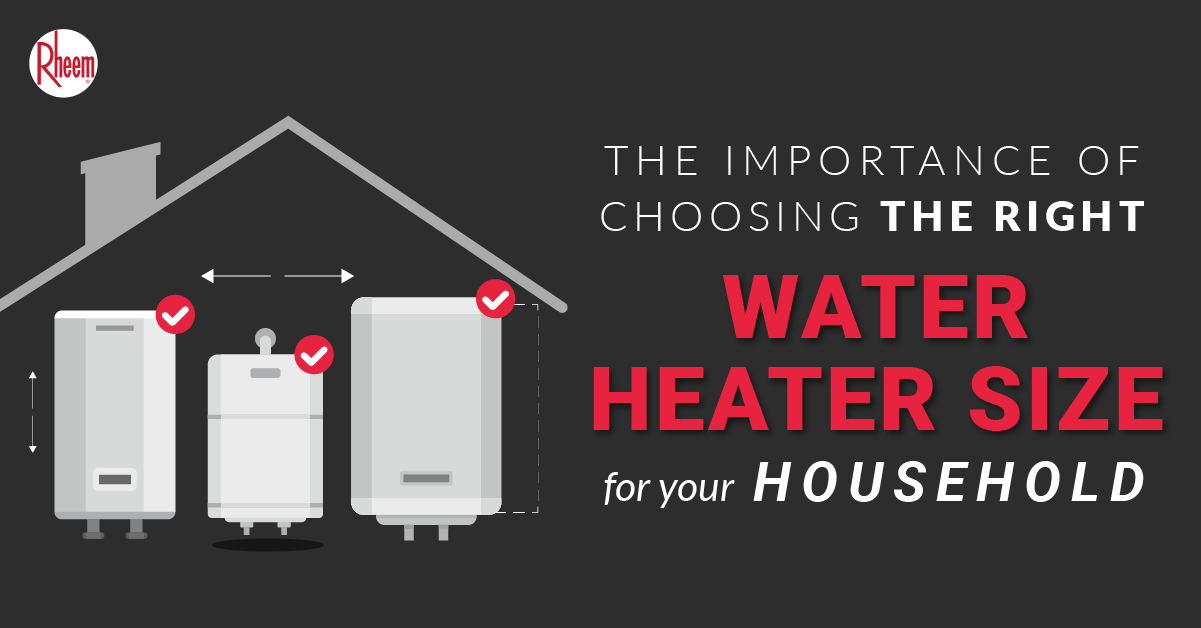The Importance of Choosing the Right Water Heater Size for Your Household
| Wednesday July 19, 2023
The peak demand for warm water in a particular household is one of the most important factors when buying a water heater in the Philippines. Every house has unique daily hot water requirements, especially if residents use the heater for various purposes. This is why people must purchase the right water heater size that can cater to their property’s warm water needs.
Buying bigger water heating units is not always the best option for many. Thinking that bigger heaters are always better is a mistake many people make when shopping for one. Purchasing the right size for your home can ensure that the heater can provide a reliable supply of warm water when needed. In addition, it can also guarantee that the unit is energy efficient, helping them reduce their electric bills and impact on the environment.
Below are some factors that should be considered when choosing the best water heater for your home.
Understanding Water Heater Sizing
Different hot water demands require different water heater sizes. And for electric storage water heaters, there are a variety of water heating units that can adequately meet a household’s varying hot water needs. The heater’s size is usually measured in gallons or liters, representing the capacity of the heater to store warm water.
And since there are a lot of sizing options available in the market, it is crucial that you know how to pick which size is ideal for your house. There are various factors that you should consider when comparing water heater sizes. This includes:
- Household Size– The number of residents in the house is one of the crucial things you must consider when choosing a water heater size. This can give you an idea of the house’s overall demand for warm water, allowing you to select the ideal heating unit for them. When estimating the household size, a rule of thumb is that each resident uses 10 liters of warm water per shower.
- Hot Water Usage Patterns– Apart from the number of people in the house, it is also vital to consider how warm water is used on the property. The number of showers, faucets, and appliances that needs warm water should be looked at, as this can help determine the possible demand for warm water within a short period.
- Peak Demand and Simultaneous Usage– Checking the hot water usage pattern can help consumers determine the maximum hot water usage during peak hours. This includes the number of family members using warm water in the mornings when preparing for the day. In addition, it would also help to consider the occurrence of multiple warm water activities happening simultaneously. This can ensure that your water heater can manage the required volume without issues.
Consequences of Buying the Wrong Heater Size
With water heaters becoming more popular nowadays, it is essential that people know how to pick the ideal heater size for their homes. Countless people make the mistake of buying impulsively because of the brand name or overall design. This results in them spending more than expected on energy bills and additional units.
Purchasing undersized heaters can lead to several consequences, including:
- Insufficient supply– One of the main disadvantages of buying smaller water heaters is that they might not be able to supply the warm water demands of the house adequately. This can lead to hot water running out quickly, especially in the mornings or evenings when several people use it simultaneously.
- Frequent Cold Water Interruptions– With smaller heaters struggling to keep up with the demands, there is a high chance that you’ll experience more cold water interruptions. Unlike tankless heaters, traditional water heating units only store a specific amount of water in the tank, which can quickly run out during peak hours. This increases the possibility of residents experiencing inconsistent water temperatures for their activities.
- Increased Work Rate– Smaller water heaters must work harder to keep up with the higher demand for warm water. The unit working at maximum capacity will decrease energy efficiency, resulting in higher energy consumption and electrical bills.
- Inconvenience– Since storage heaters only store a certain amount of warm water at a time, having lesser-capacity heaters might lead to the need to readjust many things. The people using it might need to space out their showers or even delay activities that require hot water.
On the other hand, buying bigger water heaters isn’t always the best option for anyone. Large heaters also have negative impacts, including:
- Energy Inefficiency– Larger heaters will need to constantly heat and maintain a larger volume of water, even when there is low demand. This leads to them using more energy than usual to reheat the unused water, increasing energy bills, and negatively impacting the environment.
- Potential Temperature Fluctuations– Temperature fluctuation occurs during usage as water heaters with larger storage capacity take longer to heat the water inside the tank. This can be inconvenient and uncomfortable for residents, especially when performing activities that require a steady supply of warm water.
- Shortened Lifespan– If the demand is not enough for the large capacity of a heating unit, the heater will experience fewer operating cycles. This can lead to premature wear and tear, including sediment buildup, increased corrosion, and potential damage to the heating element. This means a shorter lifespan for the heater, resulting in purchasing a replacement unit earlier than usual.
Other Steps to Determine the Right Water Heater Size
Apart from finding out the peak demand for warm water in your house, there are a few additional steps you can take to find the perfect water heater size for your home.
- Consult Manufacturer Guidelines– One of the first things you can do is to look for the manufacturer’s guidelines and recommendations online or in brochures. This can help you learn more about their products and see if there are ideal heating units that you can purchase from their brand.
- Seek Professional Guidance– Alternatively, you can also talk with professional plumbers and contractors with adequate industry knowledge. They can give valuable insights to help you make an informed decision and ensure that your water heater meets your requirements.
- Climate Considerations– Despite being a tropical country, particular parts of the Philippines have a cold climate, especially during the monsoon season. Houses in these areas usually require larger water heaters to compensate for the colder water entering the unit.
- Future Plans– Unless you’re sure that you and your family will stay in your house for a long time, it is valuable to consider your future plans when picking a water heater size. Many things that might happen in the future can affect your water heater demand, including household growth, renovations, and lifestyle changes. Considering these can help you pick a flexible heater size that can meet your long-term warm water needs.
Conclusion
Water heaters are some of the most worthwhile investments you can make nowadays. This is why it is crucial for you to know that there are many things to consider when picking a water heater size. Carefully selecting the right water heater size for your house requires research, enabling you to purchase a unit that will provide optimal performance, energy efficiency, and cost-effectiveness.
So, if you are looking for the best residential water heaters in the market, Rheem Philippines is for you. With almost 100 years in the water heating industry, we have constantly focused on innovating and creating more advanced, high-quality water heating solutions to suit our customers’ unique needs.
You can browse our extensive range of electric storage water heaters on our website. For any inquiries or more information about our products, you can also talk to one of our representatives at www.rheemphilippines.com/contact.





